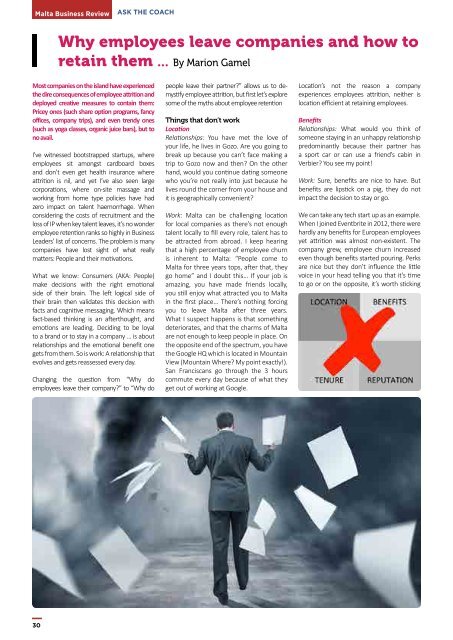MBR_ISSUE 41_Cover_LOW
You also want an ePaper? Increase the reach of your titles
YUMPU automatically turns print PDFs into web optimized ePapers that Google loves.
Malta Business Review<br />
ASK THE COACH<br />
Why employees leave companies and how to<br />
retain them ... By Marion Gamel<br />
Most companies on the island have experienced<br />
the dire consequences of employee attrition and<br />
deployed creative measures to contain them:<br />
Pricey ones (such share option programs, fancy<br />
offices, company trips), and even trendy ones<br />
(such as yoga classes, organic juice bars), but to<br />
no avail.<br />
I’ve witnessed bootstrapped startups, where<br />
employees sit amongst cardboard boxes<br />
and don’t even get health insurance where<br />
attrition is nil, and yet I’ve also seen large<br />
corporations, where on-site massage and<br />
working from home type policies have had<br />
zero impact on talent haemorrhage. When<br />
considering the costs of recruitment and the<br />
loss of IP when key talent leaves, it’s no wonder<br />
employee retention ranks so highly in Business<br />
Leaders’ list of concerns. The problem is many<br />
companies have lost sight of what really<br />
matters: People and their motivations.<br />
What we know: Consumers (AKA: People)<br />
make decisions with the right emotional<br />
side of their brain. The left logical side of<br />
their brain then validates this decision with<br />
facts and cognitive messaging. Which means<br />
fact-based thinking is an afterthought, and<br />
emotions are leading. Deciding to be loyal<br />
to a brand or to stay in a company … is about<br />
relationships and the emotional benefit one<br />
gets from them. So is work: A relationship that<br />
evolves and gets reassessed every day.<br />
Changing the question from “Why do<br />
employees leave their company?” to “Why do<br />
people leave their partner?” allows us to demystify<br />
employee attrition, but first let’s explore<br />
some of the myths about employee retention<br />
Things that don’t work<br />
Location<br />
Relationships: You have met the love of<br />
your life, he lives in Gozo. Are you going to<br />
break up because you can’t face making a<br />
trip to Gozo now and then? On the other<br />
hand, would you continue dating someone<br />
who you’re not really into just because he<br />
lives round the corner from your house and<br />
it is geographically convenient?<br />
Work: Malta can be challenging location<br />
for local companies as there’s not enough<br />
talent locally to fill every role, talent has to<br />
be attracted from abroad. I keep hearing<br />
that a high percentage of employee churn<br />
is inherent to Malta: “People come to<br />
Malta for three years tops, after that, they<br />
go home” and I doubt this… If your job is<br />
amazing, you have made friends locally,<br />
you still enjoy what attracted you to Malta<br />
in the first place... There’s nothing forcing<br />
you to leave Malta after three years.<br />
What I suspect happens is that something<br />
deteriorates, and that the charms of Malta<br />
are not enough to keep people in place. On<br />
the opposite end of the spectrum, you have<br />
the Google HQ which is located in Mountain<br />
View (Mountain Where? My point exactly!).<br />
San Franciscans go through the 3 hours<br />
commute every day because of what they<br />
get out of working at Google.<br />
Location’s not the reason a company<br />
experiences employees attrition, neither is<br />
location efficient at retaining employees.<br />
Benefits<br />
Relationships: What would you think of<br />
someone staying in an unhappy relationship<br />
predominantly because their partner has<br />
a sport car or can use a friend’s cabin in<br />
Verbier? You see my point!<br />
Work: Sure, benefits are nice to have. But<br />
benefits are lipstick on a pig, they do not<br />
impact the decision to stay or go.<br />
We can take any tech start up as an example.<br />
When I joined Eventbrite in 2012, there were<br />
hardly any benefits for European employees<br />
yet attrition was almost non-existent. The<br />
company grew, employee churn increased<br />
even though benefits started pouring. Perks<br />
are nice but they don’t influence the little<br />
voice in your head telling you that it’s time<br />
to go or on the opposite, it’s worth sticking<br />
30

















